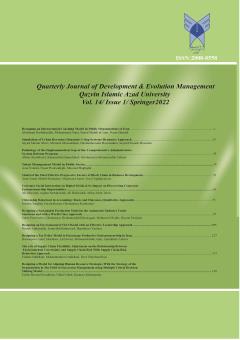Presenting a model for promoting sustainable development policies based on small wins in Iran
Subject Areas : مدیریت
mahmoud rahmatollahi
1
![]() ,
Mehdi Mortazavi
2
,
Mehdi Mortazavi
2
![]() ,
Hamed Rahmani
3
,
Hamed Rahmani
3
1 - PhD student, Department of Public Administration, Qazvin Branch, Islamic Azad University, Qazvin, Iran
2 - Associate Professor, Department of Public Administration, Faculty of Management and Economics, Tarbiat Modares University, Tehran, Iran (in charge of correspondence)
3 - Assistant Professor, Department of Public Administration, Qazvin Branch, Islamic Azad University, Qazvin, Iran
Keywords: policy, sustainable development, small wins, ,
Abstract :
Today, societies and countries strive for growth and development to achieve superiority over others. Sustainable development encompasses all aspects of growth that each society aims to realize based on its resources and circumstances. This research aims to create a model for advancing sustainable development policies in Iran, drawing from partial successes. The study employs an applied research method with a descriptive-survey approach. It involved ten influential specialists in policy implementation, with sampling continuing until theoretical saturation was reached. Utilizing a qualitative approach and classical grounded theory, data was collected through interviews, which were then coded and analyzed using the emergent (Glaser) method. The findings indicate that multiple factors influence the promotion of sustainable development policies. Based on the new concept of partial successes and extensive coding, six key factors—economic, social, cultural, strategic, environmental, and organizational—were identified, along with 18 sub-indicators. Iran has prioritized these factors to advance sustainable development. Developing countries, including Iran, consider these indicators crucial for formulating sustainable development policies to achieve this significant global objective.
[1] انصاری پور، شیوا، نوراللهی، یونس، یوسفی، حسین، گلشن فرد، امین عباس. (1400). بررسی عوامل موثر بر تقاضای انرژی به منظور برنامه ریزی توسعه پایدار در کشور، فصلنامه علمی انرژی های تجدید پذیر و نو، سال هشتم، شماره اول، 69-63.
[2] جعفری، افشین، شجاعی فرد، علی، شکور، علی. (1401). بررسی وضعیت پیاده سازی راهبردهای توسعه پایدار و تبیین نقش حقوق شهروندی در آن (مطالعه موردی: شهر شیراز)، مطالعات محیطی هفت حصار، شماره سی و نهم، سال یازدهم، 131-119.
[3] سلطانی پور، فرزانه، دماری، بهزاد. (1395). وضعیت توسعه پایدار در ایران، مجله بهداشت و انستیتو تحقیقات بهداشتی، دوره 14، شماره چهارم.
[4] الوانی، مهدی. (1393). تصمیم گیری و تعیین خط مشی دولت، تهران، انتشارات سمت.
[5] Ansell, C., Gash, A., (2007). Collaborative governance in theory and practice. J. Public Adm. Res. Theory 18, 543–571. https://doi.org/10.1093/jopart/mum032.
[6] Baum, S.D.(2019). A Survey of Artificial General Intelligence Projects for Ethics, Risk, and Policy. Global Catastrophic Risk Institute Working Paper 17-1. Available online https://papers.ssrn.com/sol3/papers.cfm? abstract_ id=3070741
[7] Birkland, T, (2015). An Introduction to the Policy Process: Theories, Concepts, and Models of Public Policy Making, Published by Routledge Press, New York,3rd Edition.
[8] Bours, Sanne A.M.J.V. Wanzenböck, Iris, Frenken, Koen, (2022). Small wins for grand challenges. A bottom-up governance approach to regional innovation policy, European Planning Studies, 30:11, 2245-2272, DOI: 10.1080/09654313.2021.1980502.
[9] Cristóbal, Jorge, Ehrenstein, Michael, Domínguez-Ramos, Antonio, Galán-Martín Ángel, Pozo, Carlos, Margallo, María, Aldaco, Rubén, Jiménez, Laureano, Ángel, Irabien, Guillén-Gosálbez, Gonzalo, (2021). Unraveling the links between public spending and Sustainable Development Goals: Insights from data envelopment analysis, Science of the Total Environment, 786 (2021) 147459.
[10] Friedrich, Christoph, Feser, Daniel, (2023). Combining knowledge bases for small wins in peripheral regions. An analysis of the role of innovation intermediaries in sustainability transitions , Review of Regional Research, https://doi.org/10.1007/s10037-023-00192-7
[11] Glaser, B. G. (2008). Conceptualization: On theory and theorizing using grounded theory, International Journal of Qualitative Methods, 1(2), 23-38.
[12] Kirchherr, J., Piscicelli, L., Bour, R., Kostense-Smit, E., Muller, J., Huibrechtse-Truijens, A., & Hekkert, M. (2018). Barriers to the circular economy: evidence from the European Union (EU). Ecological Economics, 150, 264-272.
[13] Kozioł-Nadolna, Katarzyna, Beyer, Karolina, (2021). Barriers to innovative activity in the sustainable development of public sector organizations, Procedia Computer Science 192 (2021) 4376–4385.
[14] Markey, K. Tilki, M. Taylor, G.(2020). Practicalities in doctorate research of using grounded theory methodology in understanding nurses’ behaviours when caring for culturally diverse patients, Nurse Education in Practice, https://doi.org/10.1016/j.nepr.2020.102751. 1-23.
[15] Reijnders, Bram, (2021). Small wins triggering the sustainability transition of the Dutch construction industry, Faculty of Geosciences, Utrecht University
[16] Salo, Hanna H., Berg, Annukka, Korhonen-Kurki, Kaisa, Lahteenoja, Satu, (2022). Small wins enhancing sustainability transformations: Sustainable development policy in Finland, Environmental Science and Policy 128 (2022) 242–255.
[17] Soderberg, Erik, Liff, Roy, (2023). Reframing practice through policy implementation projects in different knowledge contexts, International Journal of Project Management 41 (2023) 102452.
[18] Strauss, A. Corbin, J. (1998). Basics of qualitative research: Techniques and procedures for developing grounded theory (2nd Ed.). Thousand Oaks, CA: Sage.
[19] Subroto A., (2011). Understanding Complexities in Public Policy Making Process through Policy Cycle Model: A System Dynamics Approach, II Conference of WCSA-World Complexity Science Academy, September 26 Th – 27 Th, Palermo, Italy.
[20] Termeer, C. J., & Dewulf, A., (2018). A small wins framework to overcome the evaluation paradox of governing wicked problems. Policy and Society, 38(2), 298-314.
[21] Termeer, C.J.A.M., Metze, T.A.P., (2019). More than peanuts: Transformation towards a circular economy through a small-wins governance framework, Journal of Cleaner Production, 240, 118272.
[22] Weick, K. E. (1984). Small wins: Redefining the scale of social problems. American Psychologist, 39(1), 40–49. https://doi.org/10.1037/0003-066X.39.1.40.


